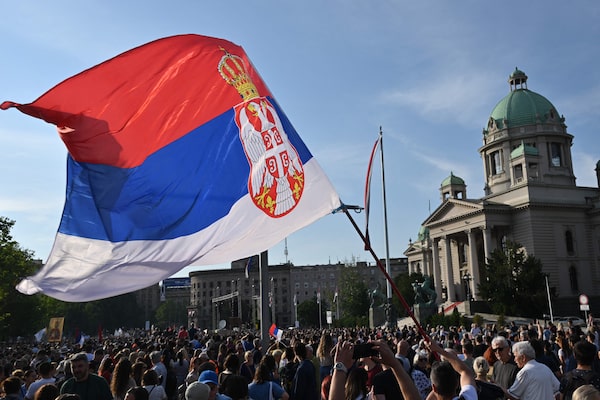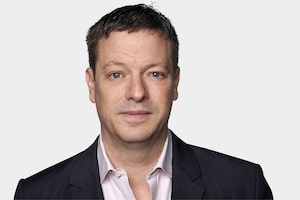
A flag of Serbia is held as thousands of protesters march during a rally to call for the resignation of top officials and curtailing violence in the media, after two mass shootings that killed a month ago 18 people, half of them children, in Belgrade on June 3.ANDREJ ISAKOVIC/AFP/Getty Images
To witness the dramatic way the map of the world is being repainted in two-tone colours by the effects of Russia’s invasion of Ukraine, look to the south and west, to a corner of Europe we usually ignore.
Two recent events occurred in the former Yugoslavia that show how the conflict has become the only issue that matters in international relations.
One is the surprising transformation of Aleksandar Vucic, the thuggish President of Serbia, into an apparent voice of anti-Moscow resistance.
Mr. Vucic, a right-wing nationalist who started in politics as the minister of information to strongman leader Slobodan Milosevic, has been Europe’s most loyal adherent to Russia. Since taking office in 2017, he has held face-to-face meetings with President Vladimir Putin every three months, embraced Mr. Putin’s conspiracy theories about Western plots and turned his country’s economy toward Moscow.
This week, however, saw a sharp about-face. Mr. Vucic acknowledged that Belgrade is now exporting arms to Ukraine, through intermediaries, and that it would not be helping the Russian war effort. Although it is still not participating in Western sanctions, Serbia, he implied, was now effectively a Kyiv-backing country: “We’ve joined all the UN resolutions” condemning 2022′s second invasion of Ukraine, he told the Financial Times, and “we won’t be a hub for re-exporting something to Russia.” And his meetings with Mr. Putin stopped in 2022, he said, and he has had no contact with the Kremlin since then: “That has never happened before.”
The other event occurred a week earlier, in the landlocked country to Serbia’s south. Kosovo, which in 2008 became the last former Yugoslav state to declare independence, has seen periodic flare-ups of street violence between its Albanian-speaking and Muslim-majority population, their government and police, and the ethnically Serbian minority population in the north. Belgrade, which does not officially recognize Kosovo’s sovereignty, has often egged on those acts of violence, as it likely did when ethnic Serbs attacked NATO peacekeepers last month, firing pistols at them and painting Russian-army “Z” symbols on their vehicles.
This time, something different happened. The United States and the European Union, which together have shepherded Kosovo’s independence and security for 20 years, turned against Kosovo’s Prime Minister, Albin Kurti, even threatening his country with sanctions. They blamed Mr. Kurti for provoking the flare-up after he installed ethnic-Albanian mayors and police forces in Serb-majority towns after their citizens boycotted municipal elections, and rejected Western-led plans to create some sort of “distinct society” province in the north.
Jeffrey Hovenier, the U.S. ambassador to Kosovo, declared on May 30 that Washington would “cease all efforts to assist Kosovo in gaining recognition … and in the process of integration into international organizations.” The years-long efforts to negotiate a peace between Kosovo and Serbia had been damaged by Mr. Kurti’s recalcitrance, he said. His EU allies strongly suggested they were also on the verge of cutting Kosovo loose.
To make sense of those shocking reversals, you have to understand the two hard-headed Balkan leaders, and their relationship to the institutions of the West.
I first met Albin Kurti in 2006, when he was a young activist who spent his nights deflating the tires of UN peacekeeping vehicles and painting anti-UN slogans on walls. He told me he considered the UN a “neo-colonial institution” that is “preventing us from becoming a nation.” When UN forces were replaced with EU peacekeepers in 2008, he said the same thing about them. His hostility to Western multilateral institutions has continued as head of government, sometimes with good reason. But it has made him a dangerous source of friction in a region that Washington and Brussels now desperately need on their side.
I first encountered Aleksandar Vucic at around the same time. He, too, was opposed to the EU and NATO, though for different reasons, rooted in the 1999 NATO bombings of Serbia. But he eventually realized that the only way to become president was by supporting Serbia’s path to EU membership; the Serbian people are overwhelmingly in favour of the visa-free travel and better livelihoods that come with EU accession.
So Mr. Vucic has juggled his loyalties to Brussels and Moscow – until this week, when he abandoned the latter. U.S. ambassador Christopher Hill said he had told the Serbian leader that “Ukraine is absolutely critical and we are at a point where all hands need to be on deck.” And Mr. Vucic happens to be facing a tough re-election campaign amid mass protests against the extreme violence that has arisen under his leadership.
Ukraine itself was once a country whose leader backed Mr. Putin while its people favoured the EU. Resolving that dilemma required a revolution in 2014 and a change of leaders, and showed the world how important a path to EU membership can be in keeping countries democratic. Mr. Vucic is evidently gambling that he can resolve that dilemma himself, if it keeps him in power.
 Doug Saunders
Doug Saunders